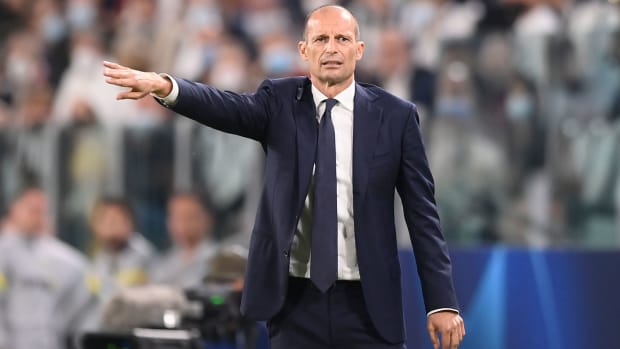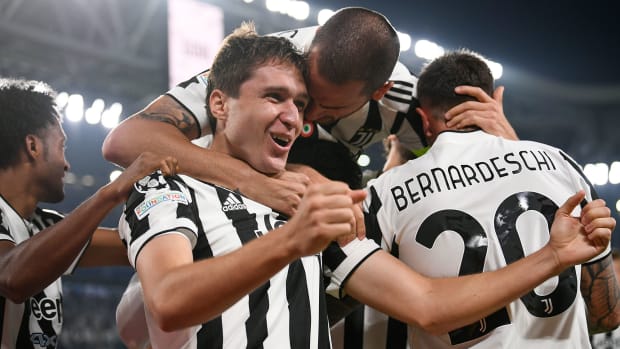A 1–0 win over Chelsea in the UCL group stage does not cure everything, but it could serve as a foundational moment for a side that is a shell of its previous dominant self.
One result shouldn’t change a season, but Juventus’s victory over reigning European champion Chelsea on Wednesday mattered far more than just three points in their Champions League group. The 1–0 win was about Juventus reasserting itself, regaining some equilibrium and offering, at last, some hope that its second stint under Max Allegri might be somewhere near as successful as his first.
Juve has not been anywhere near its best recently. It took just two points from its opening four games of the Serie A campaign and has since limped to a pair of unconvincing 3–2 victories. The simplistic explanation is to point out that Cristiano Ronaldo has left for Manchester United, and it is of course true that his goals–81 of them over three seasons in the league–helped paper over a lot of cracks. But then, he was in part responsible for many of those cracks; or, to put it more generously, his signing for €100 million in 2018 was part of a more general policy that has undermined the supremacy Juve had previously enjoyed.
When Allegri left the club in 2019, Juve had won eight league titles in a row, five of them under him. He had also won the Coppa Italia four times and taken Juve to two Champions League finals. Juve was, very clearly, one of the best sides in the world at the time. The addition of Ronaldo and his goals at great expense in 2018—after he had helped Real Madrid eliminate Juve from the Champions League in the quarterfinals earlier that year with a stunning overhead kick—was supposed to secure success in Europe. Instead, Juve promptly went out of the next Champions League in the quarterfinals to Ajax, at which point the club lost the plot.

Removing Allegri was essentially an acknowledgement that Juve was bored with domestic success. This is the superclub dilemma, to be so big that domestic success means nothing. Juve, bafflingly, appointed Maurizio Sarri as coach. He had been highly critical of Juve when he was Napoli coach, and his style of football demanded complete buy-in from the players. There was no obvious place in his system for an individualistic forward like Ronaldo. Juve remained all-powerful domestically and won Serie A, but this time the Champions League exit came in the last 16, against Lyon.
So Allegri left and was replaced by Andrea Pirlo, a club legend and a very fine player, but somebody with no experience as a manager. Juve again went out of the Champions League in the last 16, this time to Porto, but the more shocking evidence of decline came in Serie A, as it finished fourth, upon which the club came to its senses, restored Allegri and moved on from Ronaldo.
The difficult start to this season is a hangover from those past three years. What was it Juve wanted? Bringing in Ronaldo—which directors still insist was a glorious triumph in terms of raising the profile of the club, a claim that, if true, essentially means that transfers and celebrity are now more important in football than actually winning trophies—was a move that suggested an intention of replicating Real Madrid’s model of success, of having big players who won the moments (although how possible that is without a midfield that offered the control Casemiro, Luka Modric and Toni Kroos did is debatable). But appointing Sarri suggested a desire for a modern, integrated team-oriented approach. It could not work. Ronaldo’s signing stifled the tactical development of the team.
The season after Ronaldo arrived, Juve’s net spend was €20.5 million. Last summer it was €30.7 million. This summer it was €500,000. By the standards of the superclubs, even taking COVID-19 into account, these are tiny sums—and a lot of what has been spent is on loan fees, not even signings themselves. Ronaldo’s signing stifled the economic development of the team.

There are a number of very fine players at Juventus. But the problem is they have not been bought to a plan, and the past two seasons have been characterized by tactical confusion. Whether Allegri is the man to put it right can be debated—there was a sense before he left that he was a little reactive in approach, that he did not follow the proactivity that dominates the modern game—but whoever is in charge will need time to sort out the mess.
In the second half on Wednesday, there were signs of what he is aiming to achieve. With playing Chelsea tentatively, as it has been for a few weeks, Juve looked explosively quick, and won the game 10 seconds into the half with a goal from one of its brightest young talents, Federico Chiesa.
That does not mean everything is suddenly fixed, that Juventus is back to being truly among the best, but at least Allegri knows what a functional Juve now looks like.
More Soccer Coverage:

0 Comments:
Post a Comment